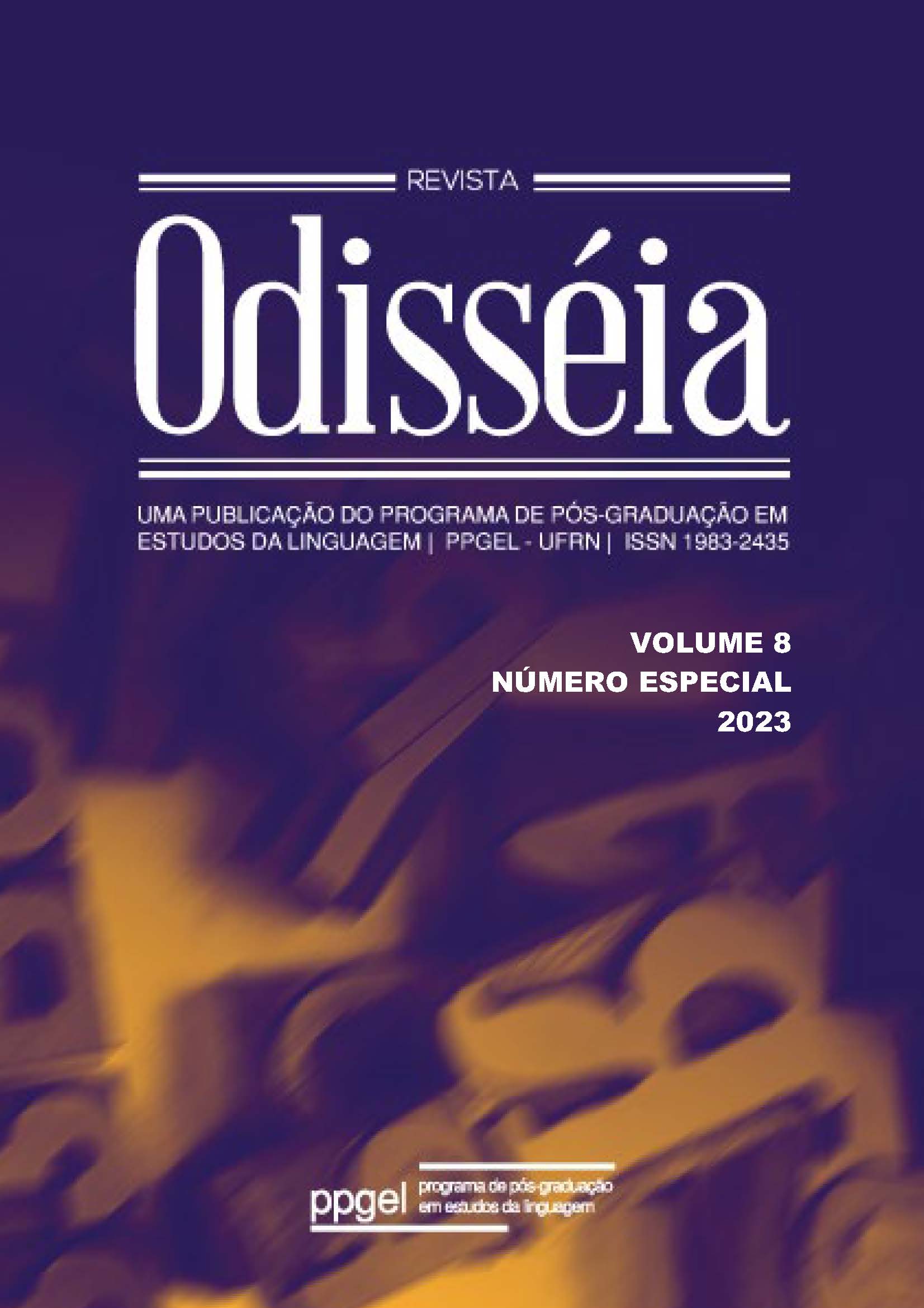Onde andará Dulce Veiga?, a novel of redemocratization
DOI:
https://doi.org/10.21680/1983-2435.2023v8nEspecialID32287Keywords:
Brazilian contemporary literature, Military dictatorship, Memory, Literature and societyAbstract
The following paper intends to analyze the novel Onde andará Dulce Veiga? (1990), by Caio Fernando Abreu, as a symbol of the process of redemocratization. In short: it intends to articulate how this work immediately answers to an ambivalent socio-historical process and how this develops itself in its own narrative universe. For that, it utilizes the theoretical discussions of Adorno (1988), Candido (2006), Gagnebin (2006), Schwarz (1978), Seligmann-Silva (2005) and AUTHOR (2015). Therefore, targeting the relations between literature and society, I shall discuss categories such as memory, forgetfulness and trauma and its implications in the narrative structure. Following this path, it is possible to see the ambivalences of the text as contradictory marks that are outside of it, characterizing the novel as, unless I am mistaken, the first one to apprehend the legacies of the dictatorship. Therefore, just as an omen, this novel points to the ghosts that belong to our social fabric and penetrate in Brazilian contemporary literature in a regular and intense form ever since.
Downloads
References
ABREU, Caio Fernando. Depoimento. Ficções, Rio de Janeiro, ano I, n. 2, p. 77-88, jul./dez., 1998.
ABREU, Caio Fernando. Onde andará Dulce Veiga? Um romance B. Rio de Janeiro: Agir, 2007.
ADORNO, Theodor. Teoria Estética. Tradução Artur Morão. Lisboa: Edições 70, 1988.
ARGENTINA, 1985. Direção: Santiago Mitre. Produção: La Unión de los Ríos; Kenya Films; Infinity Hill. Argentina, 2022. Amazon Prime (140 min).
BENEDETTI, Ivone. Cabo de guerra. São Paulo: Boitempo, 2015.
BRACHER, Beatriz. Não falei. São Paulo: Editora 34, 2004.
CANDIDO, Antonio. Literatura e Sociedade. Rio de Janeiro: Ouro sobre Azul, 2006.
CRUZ, Gill Lua. Pretéritos futuros: ditadura militar na literatura do século XXI. Tese (Doutorado em Teoria e História Literária) – Instituto de Estudos da Linguagem, Unicamp, 2021. Disponível em: https://www.academia.edu/53045448/PRET%C3%89RITOS_FUTUROS_DITADURA_MILITAR_NA_LITERATURA_DO_S%C3%89CULO_XXI. Acesso em: 25 ago. 2021.
FREUD, Sigmund. Além do princípio do prazer. In: FREUD, Sigmund. Obras psicológicas completas. Edição Standard Brasileira, Volume XVIII. Tradução sob a direção de Jayme Salomão. Rio de Janeiro: Imago, 1996.
GAGNEBIN, Jeanne Marie. Lembrar, escrever, esquecer. São Paulo: Editora 34, 2006.
GARCEZ, Lucília. Outono. Brasília: Outubro Edições, 2018.
HALBWACHS, Maurice. A memória coletiva. São Paulo: Centauro, 2004.
KOSELLECK, Reinhart. “Espaço de experiência” e “horizonte de expectativa”: duas categorias históricas. In: Futuro passado: contribuição à semântica dos tempos históricos. Tradução Wilma Patrícia Mass e Carlos Almeida Pereira. Rio de Janeiro: Contraponto: Ed. PUC-Rio, 2006.
LAGE, Cláudia. O corpo interminável. Rio de Janeiro: Editora Record, 2019.
LISBOA, Adriana. Azul-corvo. Rio de Janeiro: Rocco, 2010.
PILLA, Maria. Volto semana que vem. São Paulo, SP: Cosac Naify, 2015.
POLLAK, Michael. Memória, esquecimento, silêncio. Tradução Dora Rocha Flaksman. Revista Estudos Históricos, v.2, n.3, 1989. Disponível em: http://bibliotecadigital.fgv.br/ojs/index.php/reh/article/view/2278. Acesso em: 25 ago. 2022.
SARLO, Beatriz. Tempo passado: cultura da memória e guinada subjetiva. Tradução Rosa Freire d’Aguiar. São Paulo: Companhia das Letras; Belo Horizonte: UFMG, 2007.
SCHWARZ, Roberto. Cultura e Política: 1964-69. In: SCHWARZ, Roberto. O pai de família e outros estudos. Rio de Janeiro: Paz e Terra, 1978.
SELIGMANN-SILVA, Márcio. História como trauma. In: SELIGMANN-SILVA, M; NESTROVKI, A. Catástrofe e representação. São Paulo, Escuta, 2000.
SUSSEKIND, Pedro. Anistia. Rio de Janeiro: Harper Collins Brasil, 2022.
TELLES, Edson; QUINALHA, Renan (org.). Espectros da ditadura: da Comissão Nacional da Verdade ao Bolsonarismo. São Paulo: Autonomia Literária, 2021.
WELTER, Juliane Vargas. Em busca do passado esquecido: uma análise dos romances Onde andará Dulce Veiga? (1990), de Caio Fernando Abreu, e Benjamim (1995), de Chico Buarque. Tese (Doutorado em Estudos Literários), Instituto de Letras, Universidade Federal do Rio Grande do Sul, 2015. Disponível em: https://www.lume.ufrgs.br/bitstream/handle/10183/117544/000966284.pdf?sequence=1&isAllowed=y. Acesso em: 25 ago. 2022.
Downloads
Published
How to Cite
Issue
Section
License
Copyright (c) 2023 Odisseia

This work is licensed under a Creative Commons Attribution-NonCommercial-ShareAlike 4.0 International License.
Thisa work has been licensed under Creative Commons - Atribuição - NãoComercial - CompartilhaIgual 3.0 Não Adaptada.


















